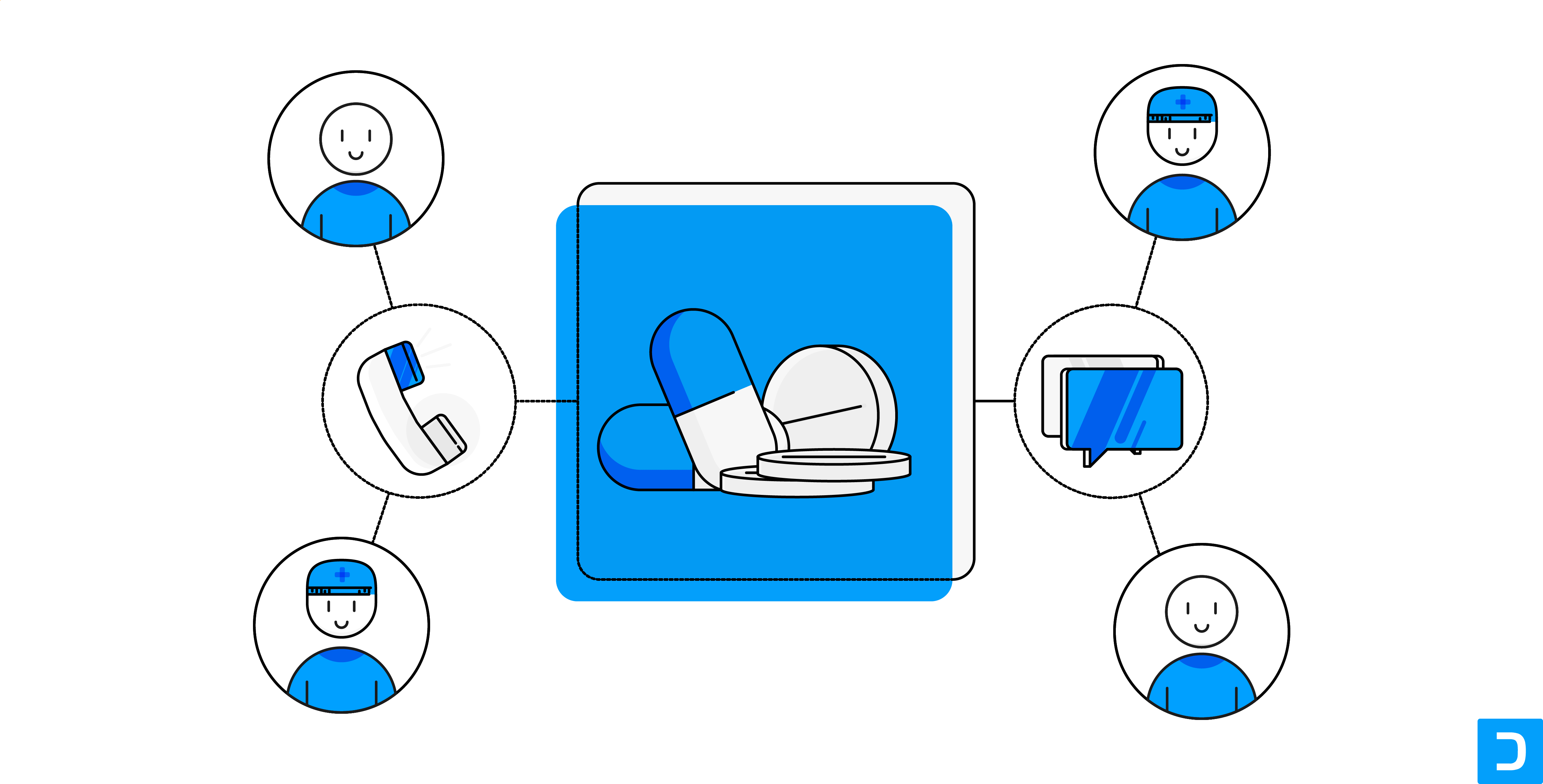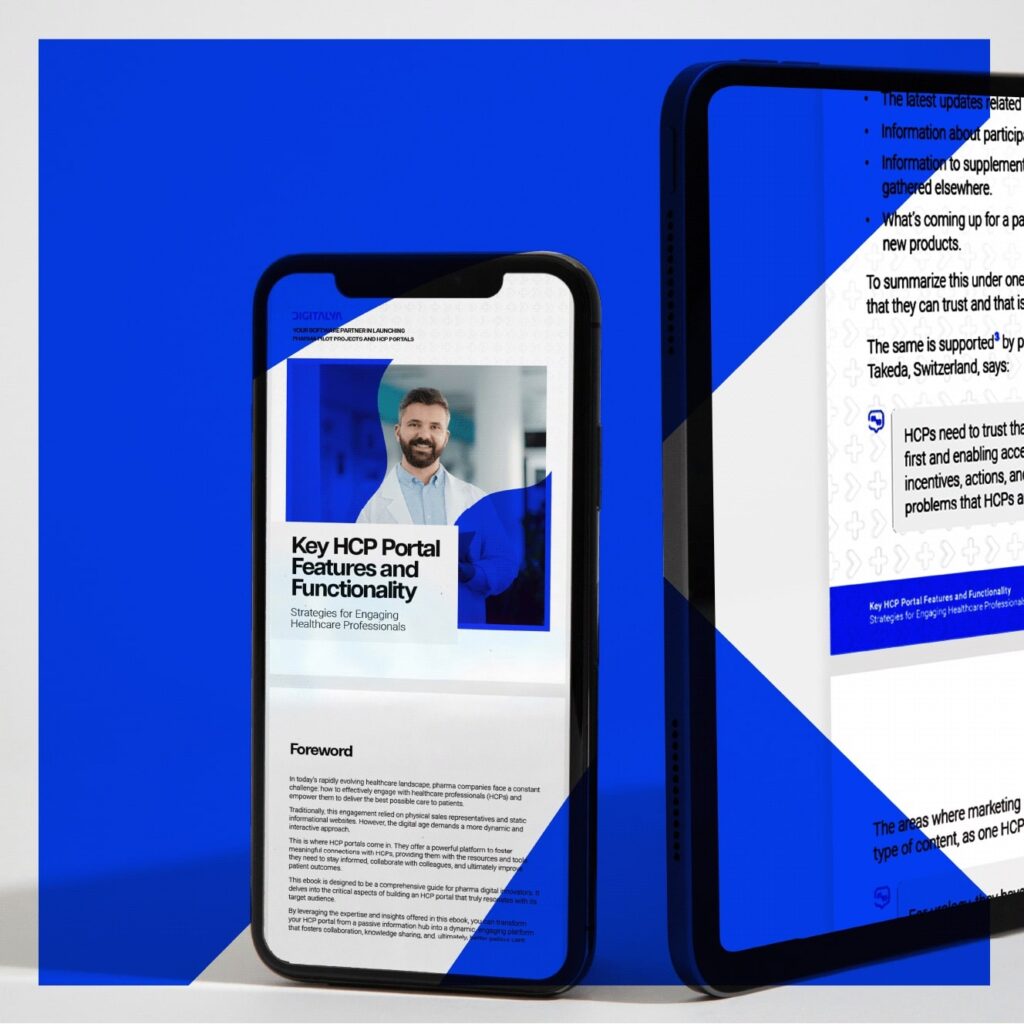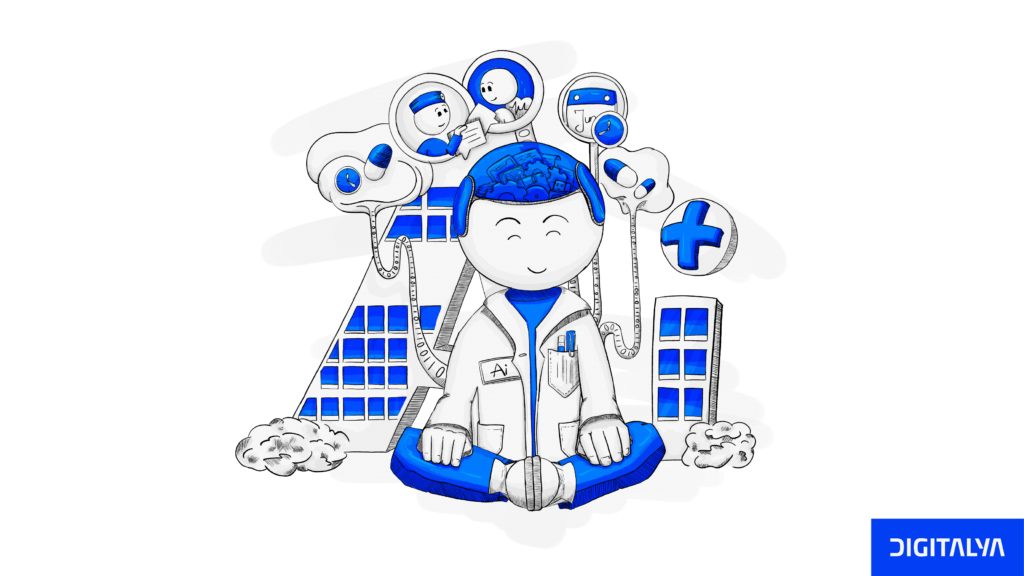The healthcare industry is rapidly evolving. Effective communication and engagement are essential for any industry, leading to omnichannel marketing emerging as a powerful tool. Pharmaceutical companies are no exception and have already started to seize the opportunity.
With the ability to personalize healthcare professional (HCP) journeys, the omnichannel approach enables companies to deliver tailored content, foster meaningful connections, and improve patient outcomes.
1. Introduction
1.1 Why is omnichannel significant in the pharma industry?
In most healthcare systems, the healthcare professionals are the link between customers (in this case, patients) and the pharma companies. These professionals play a critical role in patient care, research, and decision-making in the pharma industry. The way pharma sales teams traditionally approach marketing sales is through face-to-face meetings with prescribers.
It worked perfectly until recently, when the advancement in technology raised the pace, and change started to happen much faster. The amount of drugs that enter the market increases much faster than the HCP’s capacity to absorb the information. The same happens to pharma sales teams. Suddenly, in-person presentations for pharmaceutical products are no longer effective.
To effectively engage with HCPs, it is crucial to understand their typical journey in their roles and their customer behavior. From staying updated on medical advancements to seeking information on treatment options, HCPs require relevant and timely resources throughout their professional journeys.
However, it can be challenging to deliver a seamless experience that addresses their specific needs and preferences. The marketing strategy needs to shift from a single-channel approach to an omnichannel healthcare strategy.
Omnichannel marketing revolves around creating a seamless and personalized experience across various communication channels. By integrating online and offline channels such as email, social media channels, mobile apps, websites, and in-person interactions, pharmaceutical companies can engage HCPs effectively. It goes beyond multichannel marketing by providing a cohesive and consistent experience throughout the HCP journey.
1.2 The importance of personalizing HCP journeys for effective communication and engagement
Implementing omnichannel strategies in healthcare brings along a number of important benefits for personalizing HCP journeys, creating better customer retention in parallel with increased sales. First and foremost, it enables companies to better engage with customers and deliver personalized content that addresses the unique needs and interests of individual HCPs.
By leveraging customer data and insights, pharmaceutical companies can tailor their communication and content to match HCP preferences, ultimately increasing engagement and building trust.
Personalization plays a crucial role in customer journeys, and healthcare professionals are no different from this point of view. A personalized experience enhances the relevance and effectiveness of communication.
Why does personalization matter? By customizing communication and content, pharmaceutical companies can provide HCPs with the information they need at the right time and through their preferred channels.
A study by Across Health conducted in the US in 2022 showed growth in preference for e-engagements across channels among HCPs as compared to the pre-COVID period in 2019, while in-person interactions with pharma reps decreased. Still, the impact on prescribing behavior was positive, suggesting that the multiple marketing channels approach was well received.
The same study points out that the main factors behind an optimal user experience are fast feedback, the level of knowledge of the staff, and knowing the professional interests of the HCP.
2. Understanding HCP journeys in healthcare
2.1 An overview of the typical journey of healthcare professionals in their roles
The role of a healthcare professional is as difficult as it is important for the well-being of the entire society. Studies indicate that as much as half the clinicians experience burnout, including here physicians, pharmacists, nurses, as well as other professionals.
Every healthcare professional has a different, personal journey in their particular role. What is true for everybody working in healthcare professions is that they already have gone through a long and exhausting learning journey to land that role.
Their stamina is trained, but the effort has its toll and impacts how they navigate their current professions. It may translate into a predisposition to exhaustion, frustration, or lack of patience. This means that they will welcome solutions to ease their way into daily routines.
The journey of an HCP in their role revolves around the patient. Starting with the first patient visit or interaction (if it takes place online), it continues with investigating causes for the symptoms. This may require lab analysis and other exploratory procedures conducted by other professionals.
If the diagnosis is unclear from the beginning, a research phase begins. When it’s time to prescribe a treatment, the HCP must be aware of two important pieces of information: the profile and medical history of the patient and the medicine available on the market (and within the healthcare system).
However, anyone in a physician’s office, not to mention a hospital, has realized the number of people HCPs have to interact with within a day, thus the little time they have left between patient visits.
Not to mention the administrative tasks, especially if we talk about private surgeries. One of the biggest challenges an HCP has is finding the physical and mental space to stay informed with the latest developments in their area.
2.2 Challenges in delivering personalized omnichannel experiences
It is said that a good doctor is one who can honestly say, “I don’t know.” Of course, this is not the answer that will reassure a patient, but it is the best approach anyone can benefit from. Admitting the limitations of one’s knowledge implies an openness to searching for the right answer, taking into account all the information available.
Of course, some diagnoses are simply clear with a straightforward treatment. But even then, there may be variations depending on the patient’s own profile that could lead to a better response. Therefore, a constant search for what’s new in the medical area and the pharma industry is a must for any responsible HCP.
But with so little time and focus available, how can relevant information efficiently reach to HCPs? How can pharma representatives effectively reach their customer base and create a seamless user experience? You can find the answer by working with a healthcare development company.
Every person is different, and their approach to technology is different, not to mention interests and social interactions. Finding a way to reach your customers where they are in a manner that “speaks to them” is challenging for any omnichannel marketing campaign. And this is where omnichannel technologies can come in handy. But more on that later in the article.
3. Exploring omnichannel marketing in healthcare
3.1 What are some key principles of omnichannel marketing?
Just like in any other industry, buyers’ journey is at the core of omnichannel marketing in healthcare. In our case, omnichannel marketing in pharma, we talk about the HCPs who prescribe the medicine to patients.
Understand the customer through data
Before you are able to offer personalized and consistent customer experiences across the marketing and communication channels, you need to draw a clear picture of the customer. Use data to build the buyer persona and customer stories.
Go into as much detail as you can about what they need and expect, how they communicate, where they get their information, their shopping experience, and their online and offline interactions.
Seamlessly integrated presence
Just like any customer, HCPs use various devices and channels to gather information, communicate, and make decisions. Applying omnichannel in healthcare means being present in all touchpoints of their journey as pharma clients and staying consistent with the experience you offer in any of these points, namely the offers you present, giving the same information, the way you look and speak.
Follow a consistent brand strategy both online and offline. Use marketing automation together with CRM and each platform and device that brings together your company and the HCPs.
Personalization
Customers engage better with a brand when they find a personal connection. Once you have a clear customer journey map, a buyer persona, and the channels and tools to meet your HCPs, start making it personal. Deliver the type of information you learned they are interested in, where you know they are more likely to absorb it, and in a manner that you know resonates with them.
Some like over-the-phone conversations? Call them. Some prefer in-person meetings? Pay them a visit, then follow up online. Others are more inclined towards digital marketing? Use a healthcare omnichannel platform to deliver a personalized online experience.
Build an ecosystem
Address the HCPs’ needs, job tasks, and lifestyles through cross-channel platforms, both online and offline. Integrate all customer journey touchpoints to create a 360 degrees experience that will allow your brand to engage with customers. Adopting an omnichannel approach to marketing in healthcare means getting out of your usual pathways and meeting the customers on the track they walk on.
3.2 The difference between omnichannel marketing and multichannel marketing
At first glance, the question of omnichannel vs. multichannel doesn’t make much sense. They appear to be the same thing. But let’s take a look at the omnichannel definition, as stated by HubSpot: “is a lead nurturing and user engagement approach in which a company gives access to their products, offers, and support services to customers or prospects on all channels, platforms, and devices.”
Multichannel refers to various communication and purchase options through multiple channels without synchronization between them. There can be only two or three channels: the website, the social media page, and, for instance, a call center.
In other words, the difference between multichannel and omnichannel stands in how the channels employed work together and deliver “an integrated and cohesive customer experience.”
4. Personalization in HCP journeys
4.1 What are the benefits of implementing omnichannel strategies for personalizing HCP journeys?
As shown above, personalization is one of the key elements when it comes to omnichannel marketing strategy. Let’s see why an omnichannel strategy is important for creating custom-made experiences.
Seamless integration of online and offline channels for communication
Just like any other people, HCPs don’t use only one tool for information or communication. They may work mostly in offline environments but are also very much present online. When a marketing strategy delivers a personal, coherent experience both online and offline, the customer is more likely to become loyal. It also applies to the pharma industry.
Leveraging digital touchpoints to deliver tailored content and resources
Digital behavior has set in among HCPs, not only due to the young generations of healthcare professionals entering the workforce but also as an effect of the COVID-19 pandemic. Online meetings are still very much in place, as is the use of mobile apps and online resources.
With all the data available and the advancement of technology, creating custom experiences through all digital channels is a solution at hand, especially with healthcare app development.
Enhancing engagement through personalized training and educational materials
Education is part of a healthcare professional’s life. Their mindset is set to keep learning and acquiring new abilities. Pharma companies can offer personalized training and educational materials as part of the omnichannel experiences, which will boost customer engagement and satisfaction.
Providing relevant and timely information to support decision-making
A 2021 study by Accenture revealed that, after COVID-19, HCPs are more sensitive to spamming from pharma companies and that they seek more „truly helpful” content. Therefore, when those companies pay attention to their customers’ real needs, HCPs are willing to engage more with them. 80% of the HCPs in the study admitted to being twice as open to new pharma reps and companies provided they offered the equivalent of their best relationship.
4.2 Customizing communication and content to meet HCP’s needs and preferences
As the study by Accenture has shown, physicians are even less interested in information that does not add any value to their activity and to improving their patient’s health. So, pharma companies must listen to what HCPs need to deliver customized content around all communication channels.
When you provide customer-driven information and actionable insights, you’ll not only improve customer satisfaction but also gain their loyalty, enhance reputation and, finally, increase revenue.
4.3 Leveraging data and insights to provide personalized experiences
When you monitor the activity across various channels in your omnichannel campaign, you get important data about the HCPs’ preferences and behavior. The more aligned the channels and experiences they offer, the more coherent the insights. As a result, you can create accurate segments for your customers and learn what they expect you to deliver to maintain engagement.
5. Case studies
Let’s explore some examples of omnichannel marketing in other industries, which can also be adapted to the pharma industry, to deliver successful personalized HCP communication and brand experience.
5.1 Personalizing HCP communication through targeted email campaigns
Sephora, the beauty retailer, uses customer-driven data from their loyalty program, online and offline shops. They create personalized offers via email campaigns aligned across the web and mobile, so customers receive notifications based on their preferences and previous items they purchased.
5.2 Leveraging mobile apps for tailored medical information and resources
Mobile apps have become valuable tools for delivering personalized medical information and resources, enabling HCPs to access relevant content on demand. There are over 53000 mHealth apps currently available in App Store only, according to Statista. They range from delivering drug information to interacting with patients, monitoring patient health indicators, or connecting with peers. Such are the examples of Epocrates or Doximity.
5.3 Utilizing webinars and online platforms for interactive HCP education
Webinars and online platforms have facilitated interactive HCP education, fostering collaboration and knowledge sharing. Moreover, according to MedData Group, 96% of the HCPs interviewed think virtual HCP events and conferences as very beneficial. That comes considering that, according to Veeva and Ashfield Health, 70% of the EU HPS in 2021 are digital natives. Some popular HCP education and conference platforms are SpotMe, InEvent, and Cvent.
6. Conclusion
Omnichannel marketing is a powerful strategy that enables pharmaceutical companies to personalize HCP journeys, ultimately leading to enhanced communication and engagement.
By leveraging a range of communication channels, integrating online and offline touchpoints, and delivering tailored content, companies can foster meaningful connections with HCPs, driving improved patient outcomes.
For CEOs, VPs of Innovation, and decision-makers in healthcare and pharma, understanding and implementing omnichannel marketing will be crucial in staying ahead and delivering value in the dynamic healthcare landscape.






